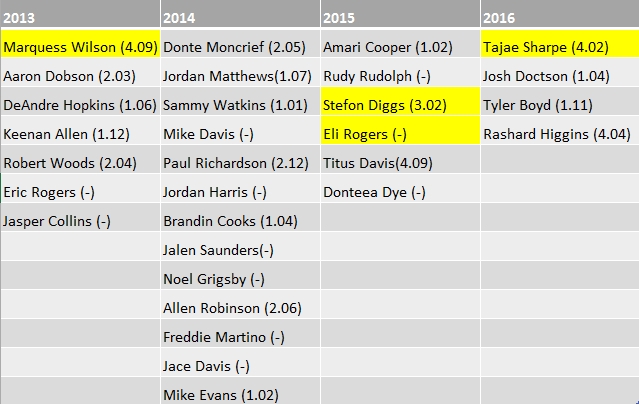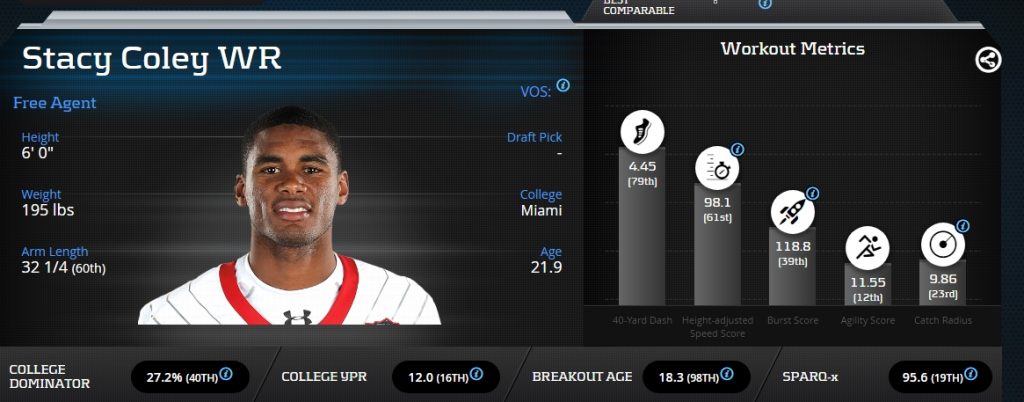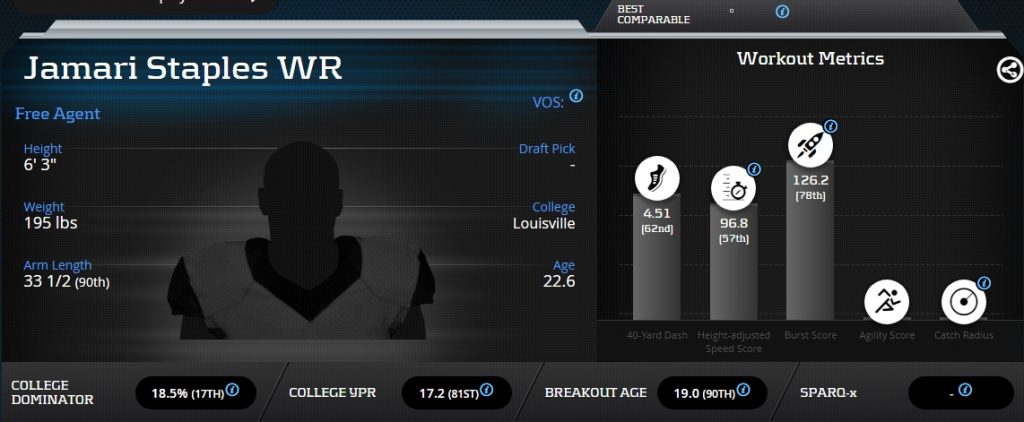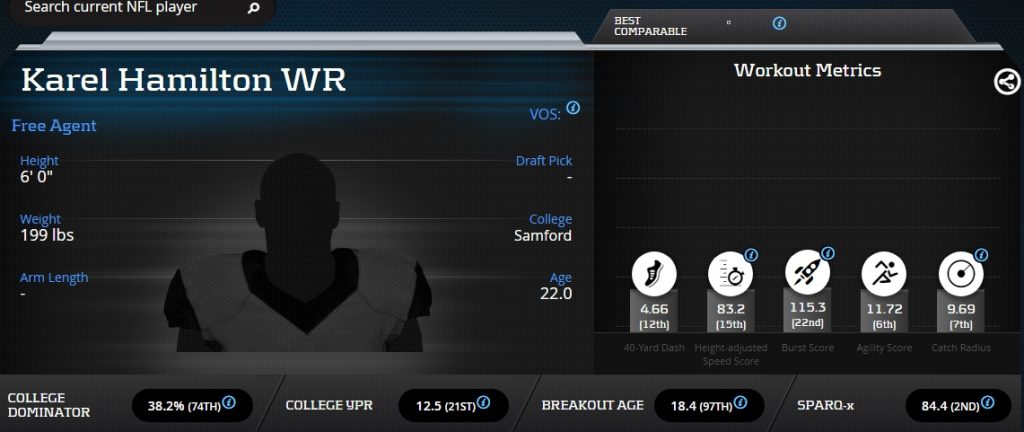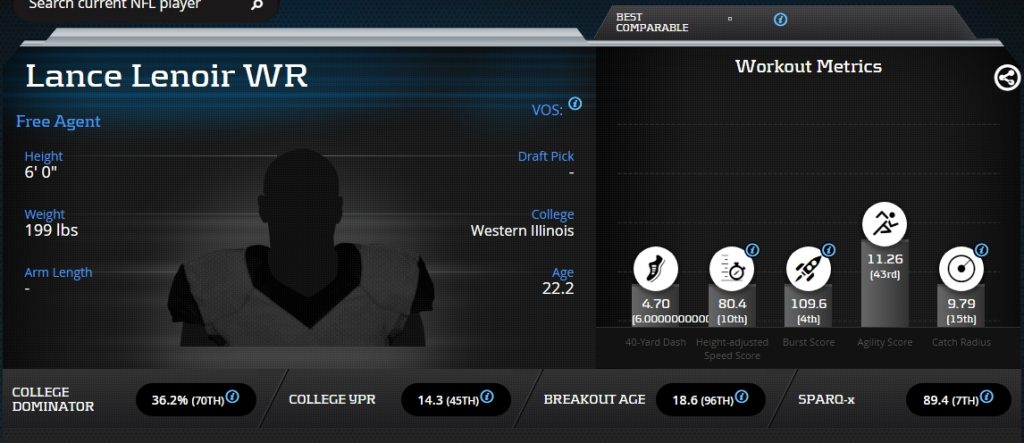In a deep league, you sometimes have to choose the best rookie roster clogger. The type of player you stare at every week when making waiver claims wondering “should I just drop this guy, already?” Last year Daniel Tarditi highlighted several advanced metrics that could help us avoid rookie 1st-round busts. I used his findings to try and mine the 2017 rookie wide receivers looking for the worst target I still like instead. There are great articles, like PlayerProfiler’s Rookie Report Series, for prospects like Corey Davis and Juju Smith-Schuster. This is the other end of the spectrum. Before the NFL draft sways opinion, I want an idea of who might be the best rookie roster clogger?
Who are the Phenoms?
Daniel Tarditi’s article used an inversion of the Phenom Index to avoid 1st-round busts. He identified two specific advanced stats and metrics that were helpful, College Dominator and Breakout Age.
Eleven wide receivers about to enter the NFL Draft have a Breakout Age in the 90th-percentile or above. The line of demarcation is 19.0 years or younger. This is more than most classes, except for 2014, which had thirteen. (Seven of the thirteen “non-bust” wide receivers Tarditi identified also had a breakout age under 19.) Here are the players that meet this Breakout Age threshold in the last 4 draft years.
To show the spectrum of value for roster cloggers, I used Dynasty Football Warehouse‘s Average ADP for 12-team PPR leagues. I highlighted players who have accrued any value (so far) who were drafted outside the top 24-picks. Paul Richardson came close to making it an every year trend at 2.12.
More than half the players in the 2017 draft that meet this same threshold are already touted as interesting prospects – Robert Davis, Isaiah Ford, Corey Davis, JuJu Smith-Schuster, KD Cannon, and Malachi Dupre. But this is a good place to dig for value every year. So, I took a look at the other guys as well. Stacy Coley, Karel Hamilton, Lance Lenoir, DeAngelo Yancey, and Jamari Staples. Only two were invited to the NFL Combine. As a group, their athletic profiles are worse. But I think College Dominator Rating identifies a couple of good dynasty taxi squad candidates that we can draft in later rounds.
The Under-the-Radar Non-Dominators
Stacy Coley, Miami
Of the five players with a 90th percentile Breakout Age or better in 2017, Stacy Coley and Jamari Staples have below average College Dominator Ratings. They are the only two invited to the NFL Combine. These are the dynasty stashes you can drop when you have to make a waiver claim if they made your team.
With a 40th percentile College Dominator Rating, Stacy Coley repeatedly played second fiddle to other prospects like Allen Hurns, Phillip Dorsett, and even fell behind Clive Walford in receiving yards in 2014. Special-teams experience (47 Kick returns for 1142 yards and 1 touchdown) may help him stick to a roster. But whether it was injury, talent or a lack of passion, as some scouts suggest, Coley never ascended to the top of the mountain in college. It’s doubtful he’ll find the climb easier on an NFL roster. He is a roster clogger with little upside.
Jamai Staples, Louisville
Jamari Staples‘ College Dominator Rating is in the 17th percentile, the worst in the group. When UAB closed its football program Staples had to transfer to Louisville in 2015. Once there he became the yardage leader with 37 receptions for 638 yards and 3 touchdowns. This was despite missing the first four games with a knee injury, but he was still second on the team in touchdowns even though he was bigger and faster than the other wide receivers. (Fun fact, James Quick had the most touchdowns that year.)
Jamari Staples took another a step back in 2016 and ended up third on the team in receiving yards. Staples’ 4.51 (62nd-percentile) 40-time and 126.2 (78th-percentile) Burst Score are interesting. However, with no special teams, experience and a lack of dominance, he is less than an ideal deep dynasty stash.
The Stand-out Phenoms
DeAngelo Yancey, Purdue
I previously highlighted DeAngelo Yancey as an intriguing player with a 33.4-percent (61st percentile) College Dominator Rating. Yancey’s 2344 receiving yards and 20 touchdowns at Purdue, combined with an impressive athletic profile, make him an ideal low-cost taxi squad stash in dynasty leagues.

Karel Hamilton, Samford
Karel Hamilton is intriguing. His profile features both a 38.2-percent (74th-percentile) College Dominator Rating and an 18.4 (97th-percentile) Breakout Age. Unfortunately, Hamilton’s athletic measurables all fall under the 25th-percentile, summarized by an 84.4 (2nd-percentile) SPARQ-x Score.
As a Senior with the Samford Bulldogs, Karel Hamilton managed 1389 receiving yards and 14 touchdowns on 111 receptions. A player’s Senior season being his best can be a cause for concern. But he also had nearly 900 receiving yards in both his Sophmore and Junior years. This production is impressive since he didn’t have much athleticism to lean on.
Karel Hamilton‘s poor athletic profile is worrying but is close to Jarvis Landry‘s. Landry is a similar height (5-11), and weight, (205 pounds) and a similar College Dominator Rating and Breakout Age.
Jarvis Landry played for LSU, and Karel Hamilton played for the Samford Bulldogs. Landry came out as a Junior as a semi-hyped prospect. He was invited to the NFL Combine and was drafted in the 2nd round of the NFL Draft. Hamilton is a Senior and won’t have that kind of draft capital. They did average similar Yards Per Reception in College and Hamilton’s production is higher against worse competition. They are close enough for me to find comfort in an archetype for Hamilton’s athletic profile at least.
Karel Hamilton could be easily be compared to unsuccessful players, like Rashard Higgins from 2016. Then again a taxi squad stash needs to develop and find opportunity. So maybe there’s hope for Higgins as well.
Lance Lenoir, Western Illinois
A relatively un-athletic Senior, with an intriguingly high-level of consistent production in college, and an amazing 18.6 (96th-percentile) Breakout Age. Lance Lenoir is exciting. Or he might be, it’s hard to tell how he will translate to the NFL. Lenoir has a 6-foot, 199-pound frame, but finding a successful NFL archetype is difficult.
Lance Lenoir had over 1000 receiving yards for 3 straight years at Western Illinois. He has the second most yards and touchdown’s of the players on this list (Karel Hamilton has more). But the consistency with which he dominated in college is promising. As a Sophomore, he produced 1030 receiving yards and 7 touchdowns. He went on to make another 1184 yards and another 7 touchdowns in his Junior year and added 1093 yards and another 7 touchdowns in his Senior year. Lucky 7? Lenoir is the best deep dynasty stash in the list based on College Dominator and Breakout age.
Lance Lenoir‘s only real positive workout metric is a 43rd-percentile Agility Score. Looking at it this way I considered him against other athletes with high agility, and not much else. Wes Welker, Danny Amendola, and Jeremy Kerley sprang to mind.
Wes Welker had similar receiving numbers in college; 259 receptions for 3069 yards and 21 Touchdowns. Lance Lenoir totaled 273 receptions for 3796 yards and 28 touchdowns, and while Lenoir has some special teams experience, Welker, Danny Amendola, and Jeremy Kerley were more productive on special teams in college. Also, they all have older Breakout Ages and worse College Dominators (as well as being around 4-inches shorter and 14-pounds lighter.)
Comparing players that are similar in size, I found three successful players who don’t necessarily dominate using their 40-time: Rishard Mattews (6-0, 210 pounds), Robert Woods (6-0, 201 pounds), and Allen Hurns (6-1, 205 pounds). All three seem like a reach because they are generally more athletic than Lance Lenoir, although Lenoir has better agility than both Robert Woods and Allen Hurns.
Rishard Matthews has a more comparable, 23rd percentile, 40-yime and 87th percentile College Dominator Rating but has significantly better Burst, Agility and Catch Radius. In Matthews junior and senior years in Nevada, he caught 2,243 yards from Colin Kaepernick. But he averaging 15.3 yards per reception compared to Lenoir’s 13.9 yards per reception with two rushing touchdowns. Matthews earned his numbers with a very different role.
Remember, these are unlikely comparisons for a deep dynasty stash. More comparisons can be made between Lance Lenoir and unsuccessful players, such as Titus Davis. Davis was a good roster clogged to watch in 2015. After going undrafted, Davis signed as a free agent in San Diego. Unfortunately, he either never found his opportunity or didn’t develop into one. After bouncing around a number of practice squads he retired from football in August 2016.
Conclusion
It’s helpful to dig through Breakout Age and College Dominator Rating for any prospect to find hidden values. All of the deep dynasty stashed outlined have flawed profiles, but like Allen Hurns in 2015, if opportunity presents itself early, they have the necessary college dominance at an early age to flash. In summary, Lance Lenoir and DeAngelo Yancey are the best of the worst.

